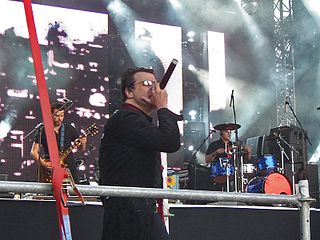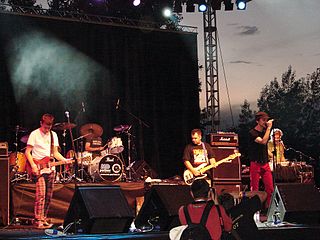Related Research Articles

Partibrejkers is a Serbian rock band from Belgrade, as well as one of the most acclaimed acts of the Yugoslav rock scene.

Galija is a Serbian and Yugoslav rock band formed in Niš in 1977.

Van Gogh is a Serbian and former Yugoslav rock band from Belgrade.

Block Out was a Serbian alternative rock band formed in Belgrade in 1990. They were one of the most notable acts of the 1990s Serbian rock scene.

Obojeni Program is a Serbian alternative rock band from Novi Sad. The band are pioneers of the Serbian alternative rock scene. The first letters of the band's first seven studio albums form an acronym of their home town. They have performed at every Exit festival since the first in 2000, with the exception of the virtual Exit held in September 2020.

Riblja Čorba is a Serbian and former Yugoslav rock band formed in Belgrade in 1978. The band was one of the most popular and most influential acts of the Yugoslav rock scene.

D' Boys was a Yugoslav synth-pop/pop rock band formed in Belgrade in 1982.

Vampiri are a Yugoslav and Serbian rock band from Belgrade. The band was formed in 1990, and performed music influenced by the 1950s doo-wop and rockabilly. After releasing two studio albums, they disbanded in 1993. The band reunited in 1995, releasing two more albums which featured a harder rock sound, only to disband for a second time in 1998. In 2012, the band reunited once again.

Alisa was a Serbian and Yugoslav pop rock band formed in Belgrade in 1984.

Zdenko Kolar is a Serbian bass guitarist, most notable as the member of Idoli and Zona B.

Korni Grupa was a Yugoslav rock band formed in Belgrade in 1968. Launched and led by, as well as named after, the keyboardist Kornelije Kovač, the band was one of the first Yugoslav rock acts to achieve major mainstream popularity in the country, and often considered the first Yugoslav supergroup. Over the period since their dissolution, Korni Grupa went on to be considered among the most prominent and influential bands in the history of rock music in Yugoslavia. The band additionally used the Kornelyans name during a short-lived commercial foray outside of Yugoslavia in an attempt at breaking into the international market with an English-language album.

S Vremena Na Vreme was a Serbian and Yugoslav rock band formed in Belgrade in 1972. S Vremena Na Vreme were one of the pioneers of the Yugoslav 1970s acoustic rock scene, and one of the pioneers in incorporating elements of the traditional music of the Balkans into rock music. The group was one of the most prominent acts of the 1970s Yugoslav rock scene.
Srđan Marjanović is a Serbian singer-songwriter from Belgrade.

September was a Slovenian and Yugoslav rock band formed in Ljubljana in 1975. They were one of the most prominent acts of the 1970s Yugoslav rock scene.

Denis & Denis was a Croatian and Yugoslav synth-pop group formed in Rijeka in 1982. They were one of the most prominent and most popular acts of the Yugoslav synth-pop scene.
Miha Kralj is a Slovene composer, singer, performer and record producer. He is a pioneer in the electronic, ambient and new-age musical genres in Slovenia and former SFR Yugoslavia. He is also called "Yugoslavian Jean-Michel Jarre".

Crveni Koralji were a Croatian and Yugoslav rock band formed in Zagreb in 1962. They were one of the pioneers of the Yugoslav rock scene.
Delfini were a Yugoslav band formed in Split in 1963. They were one of the pioneers of the Yugoslav rock scene.

Nirvana was a Yugoslav progressive rock band formed in Zagreb in 1970. Nirvana was a prominent act of the 1970s Yugoslav rock scene.

Kameleoni were a Yugoslav rock band formed in Kopar in 1965. They were one of the pioneers of the Yugoslav rock scene.
References
- 1 2 3 4 5 6 7 8 9 10 11 12 13 Janjatović, Petar (2024). EX YU rock enciklopedija 1960–2023. Belgrade: self-released / Makart. p. 108.
- 1 2 Fajfrić, Željko; Nenad, Milan (2009). Istorija YU rock muzike od početaka do 1970. Sremska Mitrovica: Tabernakl. p. 197.
- 1 2 3 4 5 6 7 8 9 10 11 12 13 14 15 16 17 18 19 20 21 22 23 24 25 26 27 28 29 30 31 32 Janjatović, Petar (2024). EX YU rock enciklopedija 1960–2023. Belgrade: self-released / Makart. p. 109.